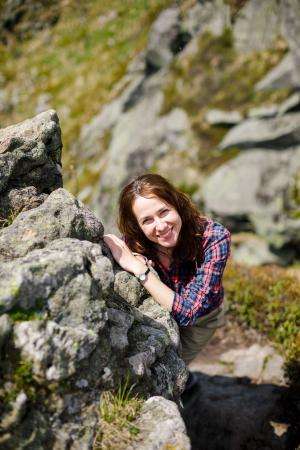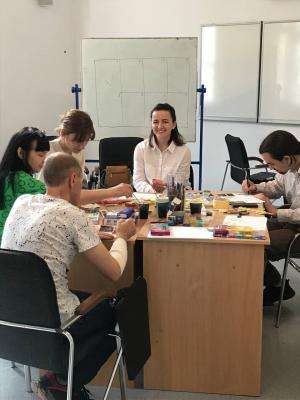Social work voices from Ukraine

Published by Professional Social Work magazine, 8 June, 2023
"The feeling of being needed kept us afloat"
When we talk about the experience of living through the war in Ukraine, we immediately think of 24 February 2022.
However, the war began in 2014, and was preceded by the events of Maidan in 2013.
It was at this time that there was a sense of loss of some kind of security, when in a peaceful country one could die because of one's beliefs - the struggle to keep Ukraine Ukrainian.
War is about loss. Loss of people, loss of security. It was then that we had our first losses. Years passed. The war was localised and we no longer received detailed information about the events in the media. Everything was quiet.
Then, in 2022, they started writing about the possibility of war. We all understood the war was already underway, but no one realised the possibility of such a scale and believed that everything would be fine.
On 24 February 2022, it all started. The first days were days of uncertainty, fear, panic. I was worried about my family. A few days later, I started volunteering. It was volunteering that distracted me from my thoughts, gave me a sense of belonging, that I was doing what I could in my place.
At first, a friend urged me to sew sleeping bags, and twice I had the experience of being on duty at the railway station when trains with people from the affected communities arrived en masse. As one student said, the railway station performs a special kind of heroism.
Our Ukrainian Catholic University opened a shelter for internally displaced persons, and our work was based there. It was a relatively comfortable place for volunteering, very close to our professional workplace at the Department of Pedagogy and Social Work.
The shelter provided temporary accommodation, food, basic necessities, medical support from a private clinic, psychological support from the university's psychologists, legal assistance from its legal clinic and students, spiritual support from the faculty of philosophy and theology, the deanery of pastoral affairs, the seminary, as well as social support from teachers and students on our programme.
This included identifying basic needs, counselling on all issues, support in restoring documents, and other services. Since the shelter had good conditions, the residents were often people with disabilities who were either in transit or staying for a longer period of time.
The shelter was home to people of different backgrounds and statuses. At the same time, they all had the same needs – care and some guidance on what to do next.
The feeling of being needed kept us afloat. At the same time, our activities were a very big responsibility, because each of our residents is a wounded person with different experiences of surviving the war, different experiences of getting to safe regions.
It was these people who made it possible for us to see the horror of war, and thanks to them we could understand how generous our people and our region are. All the help we needed was provided. I was proud that at the very beginning people themselves were able to organise aid stations, heating, accommodation, transportation - everything!
In addition, a large part of the aid is to help the military - everything from food to equipment to help defend our country including the purchase of thermal imagers, body armour, equipment, cars...
Part of the volunteer assistance is to help the military, and part of the military is to volunteer. The country has become united. This understanding keeps us together.
But we are being destroyed. Just for being there. And we have to hold on to the end, because we have to stand up and survive. We pray. We are supported. We need more for the military. We will manage with the rest. And it's so nice that recently the Netherlands sent tulips to Lviv. Now the whole city is blooming with the colours of faith in us.
Dr Iryna Krynytska is head of the department of pedagogy and social work at the Ukrainian Catholic University

Displacement raises questions of identity and belonging
Now I understand when somebody says: "I don't know where to start."
The war in Ukraine is the most well documented war to date. We have all witnessed the brutality and horror, crimes against humanity, unprecedented aggression against a sovereign state, the slaughter of civilians and the abduction of children.
It would be difficult to find a person who has not heard about Russia's full-scale invasion of Ukraine in February 2022.
The first days, weeks, and months of the war are etched in our memories, but the amount of suffering has only increased. Missile attacks on Ukrainian towns and villages, an increase in civilian casualties, violence, and trauma continue. And because it continues, this makes it impossible to look back fully, to work through the traumas, to calculate the losses, to move on.
All the people’s efforts are aimed at addressing the most urgent and acute problems - mental health, children's safety, continuing education, supporting the army, volunteering, and helping displaced persons.
My involvement and volunteering in the first months of the war was to receive internally displaced people in Lviv and provide shelter to those who stayed here for a few days or longer - in the city library "Sensoteka", in private apartments, on the campus of the Ukrainian Catholic University and in other shelter houses in Lviv, of which there were about 300.
Only a few of them are still in operation. In Lviv, about 1,000 people live in temporary shelters, and their everyday life and work are determined by this fact. Lviv and many other cities in the west have become a refuge for thousands of internally displaced people and a humanitarian hub for Ukraine.
Ukrainian society has resisted Russian aggression with its cohesion, self-organisation, and sacrifice. People have learnt to cooperate, support each other, and help each other.
Millions of Ukrainians have evacuated to other cities in Ukraine and to other countries around the world. This is a wave of migration not seen since the Second World War. According to the UN, there are about 14 million Ukrainian refugees and internally displaced persons.
Displacement evokes strong emotions, both in the victims who experience the catastrophe of war, and in the countries that host the displaced. Responding to the needs of those who are displaced or migrate raises questions of identity, belonging, and perceived ties to specific territories.
Different groups of people respond to disasters in different ways. People living in poverty or belonging to ethnic minorities, people living in the occupied territories of Ukraine or living close to the front line often experience the worst of the effects. International organisations, volunteers and the government are making every effort to respond adequately and help the most vulnerable groups and ease the burden to help them survive.
Dr Kateryna Buchko is a lecturer in social work at the Ukrainian Catholic University
